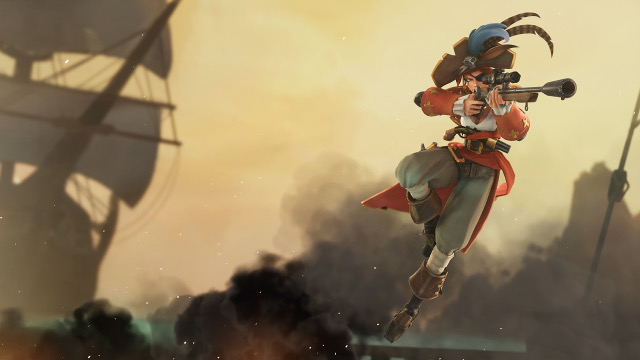This weekend, Amazon doubled down on its role in the video game landscape with the announcement of three new PC games and the integration of Twitch under the larger Amazon Prime umbrella. As someone who already plunks down a bill every year for free 2-day shipping, this was icing on the hundred dollar cake. However, even more exciting was that Amazon finally showed its hand with the announcement of Crucible, New World, and Breakaway. Of the three, Breakaway was the only one in attendance this weekend at TwitchCon, and if it’s any indication of the direction Amazon is moving toward, it’s a promising start.
Amazon was very excited to show off Breakaway, as its booth dominated the TwitchCon floor with monitors, lights and tournaments hosted all weekend. After sitting down with Patrick Gilmore, Studio Head of what was formerly Double Helix – now Amazon Game Studios Orange County – I got a better idea of Breakaway’s pedigree and how that will affect the game’s growth overall. As games become less about a singular purchase and more about fostering a community, Breakaway is intent on laying down the foundation. With easy-to-use Twitch integration for broadcasting and mechanics not unlike basketball and football, this was about making a game that is just as fun to watch as it is to play. It’s all well and good to feed me the PR, but the question on my mind as I sat down was simply, is it fun to play?
In a word, yes.
I was thrown fast and furiously into a bout with six grown men and a child no older than ten. As luck would have it, the kid was placed on my team. I say that sarcastically, as it was clear the grown men had been spending their entire TwitchCon thus far in front of this game. The kid, meanwhile, kept having problems with his controller. Right.
Breakaway’s MOBA influences are obvious from the get-go. Each character has a specific role to play on the team, with various abilities that can be upgraded in between rounds. In addition, each character possesses two “buildables” – fortifications and objects that provide additional offense or defense. The comparisons end there, however, as the rest of it has more in common with traditional sports. A ball at the center of the stage is the primary means of winning a round. Players can pass between each other, and a single enemy hit can take it away. It was all very fast, and the few times I was able to get a hold of the ball I was either knocked off the ledge or knocked out completely (initiating the very MOBA-esque death timer penalty). I watched as one of my teammates ran around in circles, passing the ball to our opponents instead of his teammates. It was probably the kid.
Rounds were mercifully short, and the opposing team wiped us out in less than ten minutes. This, according to Patrick Gilmore, was the intent – the short game length, not my devastating loss – and another way Breakaway aims to create a broadcaster friendly experience. As someone who grew up with people watching him play video games because there was only one television in the house, the intended goals of Breakaway are almost foreign to me. But for Amazon, who owns Twitch, it makes perfect sense. It was but a small taste of what Amazon has in store, but a promising one nonetheless.







